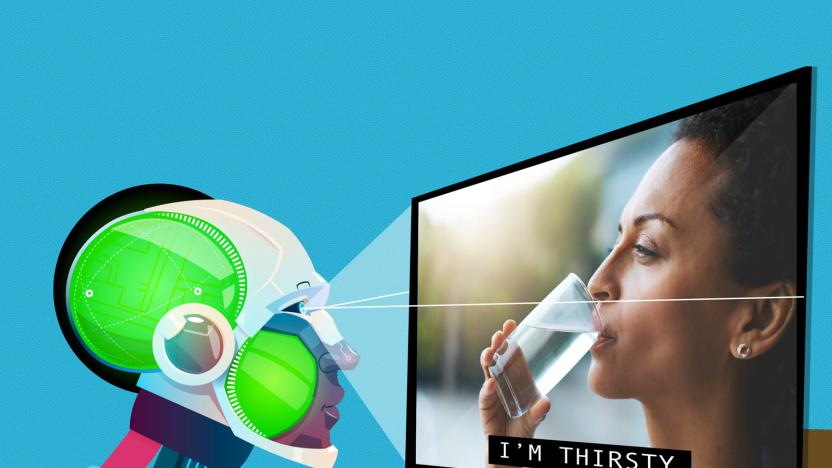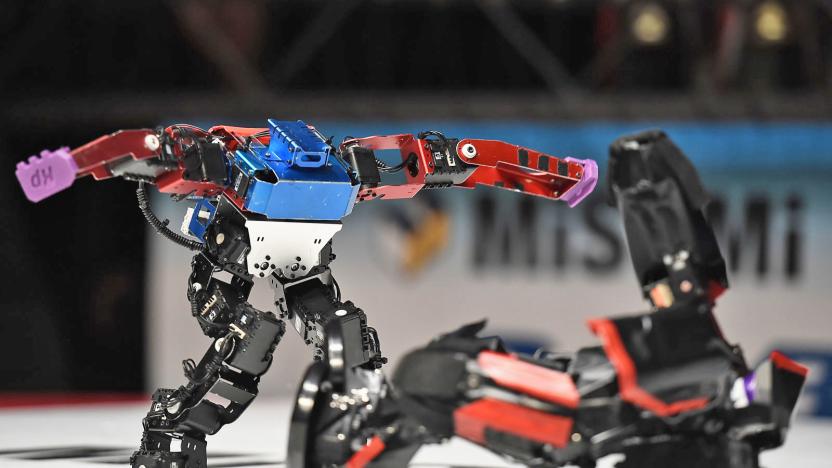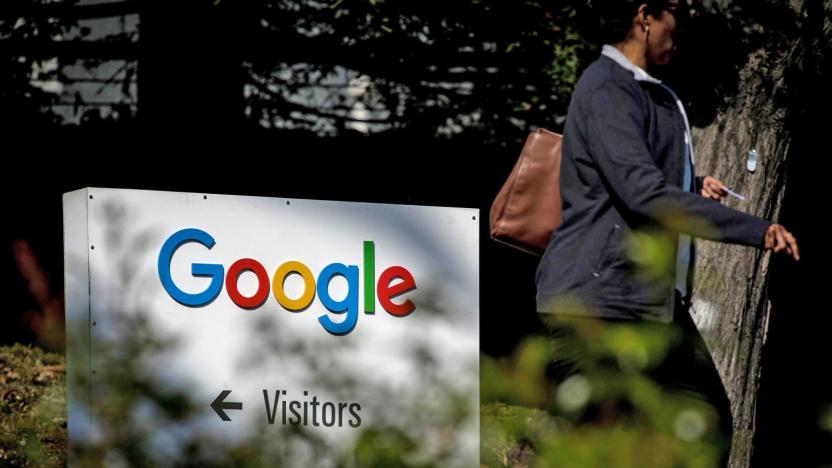artificialintelligence
Latest

Facebook open-sources its Horizon AI platform
If you could crack open Facebook and see the gears turning under the social network's face, you'd find a surprising amount of artificial intelligence being applied in all sorts of ways. As of today, the company is pulling back the curtain and making Horizon -- the company's end-to-end applied reinforcement learning platform that helps fine-tune that AI -- open source.

MIT-developed AI learns language like a child does
When you teach language to AI systems, you typically use annotations that describe how words work. But that's not practical in many cases -- even if everybody agrees on those annotations, they often take a lot of time to produce and can still seem unnatural. MIT's solution? Have AI learn like a child. Its researchers have developed a parser that imitates kids' learning processes by observing scenes and making connections.

Experimental AI lie detector will help screen EU travelers
In the future, you might talk to an AI to cross borders in the European Union. The EU and Hungary's National Police will run a six-month pilot project, iBorderCtrl, that will help screen travelers in Hungary, Greece and Latvia. The system will have you upload photos of your passport, visa and proof of funds, and then use a webcam to answer basic questions from a personalized AI border agent. The virtual officer will use AI to detect the facial microexpressions that can reveal when someone is lying. At the border, human agents will use that info to determine what to do next -- if there are signs of lying or a photo mismatch, they'll perform a more stringent check.

Google pledges $25 million toward AI solutions for social issues
Google isn't just backing away from its military AI contract, it's promising to use that computational power for more positive purposes. The company has launched an AI for Social Good program that will unify engineering and research efforts dedicated toward noble causes, such as conserving wildlife, finding jobs, predicting floods and anticipating health risks. The effort will tap experts outside of Google for help, but that's not the only approach -- it's calling for ideas from non-experts, too.

Arlo cameras will soon detect animals, vehicles and packages
Arlo's cameras are getting more AI-powered features though the Arlo Smart subscription service, which will soon detect packages, animals and vehicles. The features arrive later this year and will work with all Arlo cameras.

AI-generated painting sells for $432,000 at auction
A painting created by artificial intelligence sold for $432,000 at the Christie's Prints and Multiples art auction in New York. The piece, called "Portrait of Edmond Belamy," is the first artwork made entirely by AI to go up for sale at a major art auction. It was expected to fetch between $7,000 and $10,000, making the $432,000 haul quite the shocker.

AI might concoct your next perfume
Perfumers look out: IBM Research partnered up with one of the top producers of flavors and fragrances, Symrise, to create an perfume-concocting AI. Named Philyra, after the Greed goddess of fragrance, it uses machine learning to sift through thousands of ingredients, formulas and industry trends to derive what IBM considers to be unique combinations. IBM is leveraging the AI to help perfumers design the next great scent rather than a machine that will replace experts of the human nose.

MIT’s $1 billion college will teach the theory and ethics of AI
Today, the Massachusetts Institute of Technology announced that the university is launching the Stephen A. Schwarzman College of Computing, which is specifically focused on the rise of artificial intelligence. MIT is committing $1 billion to focus on the "ethical evolution" of AI that is already affecting and shaping our society in order to be a global leader in this popular field.

Researchers develop a computer that's fooled by optical illusions
Say you're staring at the image of a small circle in the center of a larger circle: The larger one looks green, but the smaller one appears gray. Except your friend looks at the same image and sees another green circle. So is it green or gray? It can be maddening and fun to try to decipher what is real and what is not. In this instance, your brain is processing a type of optical illusion, a phenomenon where your visual perception is shaped by the surrounding context of what you are looking at.

Facebook's Marketplace adds AI help for buyers and sellers
Facebook has rolled out new AI features for the Marketplace to celebrate its Craigslist-rival's second birthday. If you upload a photo of an item you want to sell, you'll notice that its interface will now automatically choose a category for you and even give you price range suggestions. That's because the AI can now recognize if what you're selling belongs under "furniture" or any other category based on the photo you took. Also, it can now compare your item against other similar listings to give you an idea of how much other people are asking for theirs.

Senate bill would boost AI adoption in federal government
The US government is only dabbling in artificial intelligence at the moment. It might make a larger commitment before long, however. A bipartisan group of senators (Brian Schatz, Cory Gardner and Rob Portman) have introduced an AI in Government Act that would increase federal AI adoption by both including AI in data-related plans and supplying the resources to make those plans a reality. Thankfully, this isn't just a question of throwing money at the problem -- it would have multiple government organizations shift more attention to the emerging technology.

DeepMind and Unity will work together on AI research
Alphabet's DeepMind division is partnering with Unity to accelerate machine learning and artificial intelligence (AI) research. The new collaboration will focus on "virtual environments" that DeepMind can use to test and visualize experimental algorithms. Otherwise, little is known about the partnership. Today's announcement is basically a broad agreement, or statement of intent, between the two companies. "I couldn't be more excited to be collaborating with Unity, creating virtual environments for developing and testing the kind of smart, flexible algorithms we need to tackle real-world problems," Demis Hassabis, co-founder and CEO of DeepMind said in a press release light on detail.

What will Android look like in the next ten years?
A decade ago, Android launched... to a world of challenges. But back in 2008, Google wasn't worried about artificial intelligence, it was just trying to make a stable mobile operating system. One that stood out in a very crowded playing field. Back then, the competition was Apple, BlackBerry, Nokia/Symbian, Palm and Windows Mobile. By 2009, however, Android's market share was steadily climbing, and by early 2010, sales inched past that of iOS devices (according to Statista). Android's upward trajectory hasn't stopped since. Now, Statista reports 88 percent of all smartphones sold run Google's mobile operating system, with iOS devices making up around 12 percent (based on total sales). What started as an alternative mobile experience for nerds has gone full mainstream. But what does that mean for the future of Android?

Sony's reborn Aibo robot is available for pre-order in the US
Sony's relentlessly adorable Aibo robot is finally ready to return to American shores. After months of waiting, you can pre-order a First Litter Edition of the robo-pup in the US ahead of an expected mid-December ship date. You'll be spending a staggering $2,900 to play with the limited-run mechanical canine. The kit includes everything you'll need to get started, however -- you'll get a bone (sorry, aibone), a pink ball, paw pads and three years of AI cloud service to help Aibo learn.

Facebook is fact-checking photos and videos to fight fake news
It's no secret that Facebook has been struggling to stop fake news from spreading on its site, though it has indeed made progress since the 2016 US presidential election. Now, as part of its ongoing efforts to fight misinformation, Facebook has announced that its 27 fact-checking partners across the world now have access to a new tool that will analyze pictures and videos. According to Facebook, this feature is powered by machine learning and is designed to help reviewers identify and take action against false content faster.

Samsung's New York AI center will focus on robotics
Samsung now has an artificial intelligence center in New York City -- its third in North America and sixth in total -- with an eye on robotics; a first for the company. It opened in Chelsea, Manhattan on Friday, walking distance from NYU (home to its own AI lab) boosting Samsung's hopes for an academic collaboration.

AI robots can develop prejudices, just like us mere mortals
It's not only humans and animals that can hold biases against outsiders. Psychology and computer science researchers from the Massachusetts Institute of Technology and Cardiff University have discovered that artificial intelligence robots can develop prejudices by learning from each other.

Lockheed's drone challenge: create an AI pilot that beats pro racers
While autonomous drones exist, they're not usually what you'd call speedy when many skilled pilots could beat them in a race. Lockheed Martin and the Drone Racing League want to do better. They're launching an AlphaPilot Innovation Challenge that will encourage the public to develop drone AI that can not only race at high speeds, but win. Competitors will have to build an NVIDIA Jetson-based AI system that can swiftly move through the League's Artificial Intelligence Robot Racing circuit.

Twitter's shadow banning bug 'unfairly filtered' 600,000 accounts
Twitter's supposed account shadow banning, which the company says was a bug, was "unfairly filtering 600,000 accounts, including some members of Congress" in search auto-complete and results. CEO Jack Dorsey confirmed the figure during his opening statement to the House Energy and Commerce Committee Wednesday; he shared the statement in a thread of tweets.

Google offers AI toolkit to report child sex abuse images
Numerous organizations have taken on the noble task of reporting pedophilic images, but it's both technically difficult and emotionally challenging to review vast amounts of the horrific content. Google is promising to make this process easier. It's launching an AI toolkit that helps organizations review vast amounts of child sex abuse material both quickly and while minimizing the need for human inspections. Deep neural networks scan images for abusive content and prioritize the most likely candidates for review. This promises to both dramatically increase the number of responses (700 percent more than before) and reduce the number of people who have to look at the imagery.









